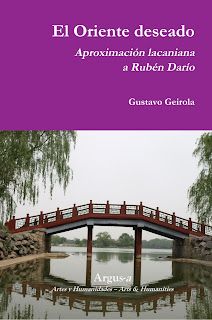
Oriente es para Darío un objeto “deseado”, de modo que su deseo, como falta de objeto, se dirige hacia una meta en cierto modo inalcanzable y, como sabemos, inalcanzada, ya que Darío, a diferencia de otros modernistas, nunca pudo viajar a esa región, la cual permanecerá en él imaginada, es decir, abastecida por los estereotipos y los textos provistos por el Otro, especialmente europeo. Sin embargo, Darío dice sufrir “nostalgia de lo desconocido”, con lo cual abre su hermosa frase a otra dimensión interpretativa. Darío posiciona el Oriente como un objeto perdido, que da origen a un duelo por la pérdida de un objeto amado, lo cual no deja de ser, en el caso del Oriente, una paradoja, porque nunca lo tuvo; y, por otra parte, no deja de insinuar que el Oriente es también su propia patria. No hay que ser demasiado freudo-lacaniano para entender esta paradoja: lo perdido del deseo es precisamente aquello que lo causa; es además lo que el deseo busca, aquello que añora. El objeto perdido es lo que ha sido prohibido (triangulación edípica de por medio) en el pasaje de lo imaginario a lo simbólico: la Madre.
Abstract
The East is for Darío a “desired” object, so that his desire, as a lack of an object, is directed towards a goal that is somewhat unattainable and, as we know, unattained, since Darío, unlike other modernists, could never travel to that region, which will remain in him imagined, that is, supplied by the stereotypes and texts provided by the Other, especially European. However, Darío says he suffers from “nostalgia for the unknown”, with which he opens his beautiful phrase to another interpretive dimension. Darío positions the East as a lost object, which gives rise to a mourning for the loss of a loved object, which is still, in the case of the East, a paradox, because he never had it; and, on the other hand, he does not stop insinuating that the Orient is also his own homeland. You don't have to be too Freudo-Lacanian to understand this paradox: the loss of desire is precisely what causes it; it is also what desire seeks, what it longs for. The lost object is what has been forbidden (Oedipal triangulation in between) in the passage from the imaginary to the symbolic: the Mother.


